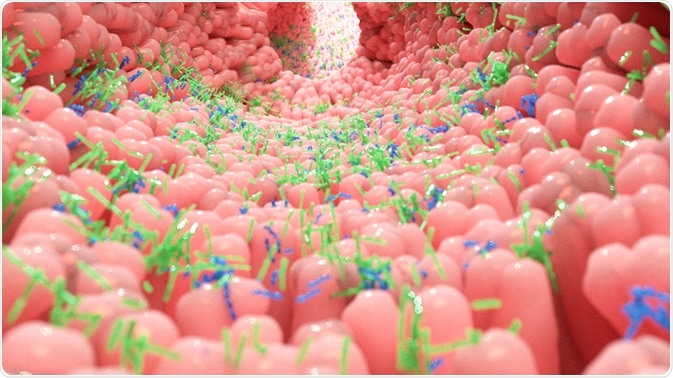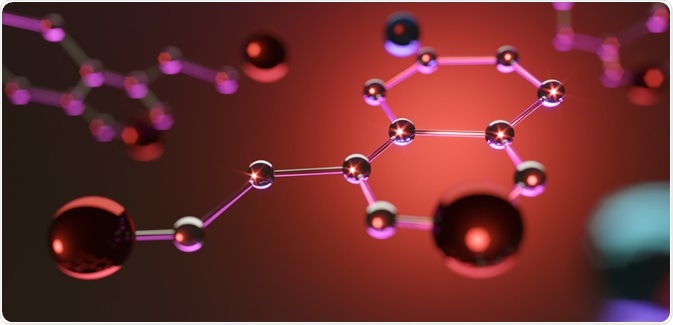Over the past decade, there has been increasing evidence to suggest the gut microbiota can influence both aspects of disease and also brain development and function. Early studies on germ- free mice have indicated the microbiome can influence the development of the stress response.

Image Credit: Alpha Tauri 3D Graphics/Shutterstock.com
Antidepressants are key drugs used in the treatment of depression. The most common mechanism of which is inhibiting serotonin and norepinephrine reuptake leading to an increase in synaptic concentrations of these key neurotransmitters.
Whilst they have been used for >50 years, the precise mechanism of their therapeutic action is not yet understood. Further added to this, it is also not clear as to why there is a degree of variation in the efficacy of antidepressants between individuals.
It has previously been assumed that the therapeutic effects are achieved through slow-onset auto-receptor-down regulation and the subsequent adaptation of downstream neural signaling pathways- this also includes neuroplasticity.
Previous links to disease
Previous research has proposed that anti-depressants may be able to modulate the composition of the microbiota, at least in part to exert their effects. Notably, some antidepressants have been shown to modulate the microorganisms through inhibition of slime production and motility.
On the other hand, serotonin, when present in the gut can promote the virulence and growth of certain bacteria.
Furthermore, microbiota may also be able to modulate depressive-like behaviors through modulating neurotransmitters and other key components. The microbiota has a surprising ability to produce neuroactive compounds and neurotransmitters which may influence the host's physiology and behaviors.
In addition to this, the host microbiome can influence the production of serotonin by enterochromaffin cells in the host gut. This is interesting to note as the gut is the main source of serotonin within the body.
This in turn further contributes to the hypothesis that antidepressants may partially mediate their effects through the regulation of the host microbiome.

Image Credit: Vladimir Zotov/Shutterstock.com
Current evidence
An in vivo study by Lukic et al. used BALB/c mice to explore the effects of the chronic treatment with one of five antidepressants (fluoxetine, escitalopram, venlafaxine, duloxetine, and desipramine). From this, their gut microbiome was analyzed through the use of 16s rRNA gene sequencing.
Once the differences in microbiota were characterized, the chosen bacterial species were supplemented to vehicle and antidepressant treated mice. Their behavior was then further assessed to determine the bacterial effects.
The evidence demonstrated that common anti-depressant therapies can change the composition of the gut microbiota and therefore may play a role in their mechanism of action. It was found through the supplementation of Ruminococcus flavefaciens reversed the behavioral symptoms associated with duloxetine administration, acting as an anti-depressant.
R. flavefaciens supplementation has also induced changes in cortical gene expression.
Lyle et al. administered fluoxetine at the recommended daily dosage to healthy male mice and similarly reported a significant, time-dependent alteration of the microbiota, based on fecal 16S rRNA analysis.
It was also reported there were changes to the body mass following fluoxetine administration. Among the microbiota decreased was Lactobacillus, which has been previously associated with body mass regulation. This suggests that the microbiome may be associated with some side effects seen such as weight loss.
There have been limited observational studies in humans have examined anti-depressants as a variable when comparing the microbiome profiles. In a study of 76 elderly patients on polypharmacy, the use of anti-depressants was positively correlated with several taxa.
Whilst the investigation of effects of NSAIDs on the microbiome found the citalopram was significantly associated with a 32% increase in the abundance of the Enterobacteriaceae family. They further found that anti-depressant use moderated the effects of NSAIDs.
Influence on treatment efficacy
The effect anti-depressants have on the microbiota may influence the treatment efficacy. Whilst there is no experimental data yet to support this; there is evidence that antibiotic-induced dysbiosis can have consequences for the brain and subsequently the behavior in rodents.
Several studies have identified an increase in depression-like behavior in adult-treated rats and mice and decreased anxiety-like behavior in prenatally and adolescent- treated mice. Interestingly, some antibiotics can exert a direct action on the brain.
There are several possible ways in which dysbiosis could influence efficacy. In some rodent studies, antibiotic-induced dysbiosis has been demonstrated to reduce hippocampal levels of brain-derived neurotrophic factor (BDNF) which is known to promote adult hippocampal neurogenesis.
Current evidence may suggest hippocampal neurogenesis may be needed for the action of antidepressants. Furthermore, there could be gut mediated effects on the serotonin system. Dysbiosis has been shown to reduce hippocampal serotonin and the microbiome composition has implications for serotonin metabolism.
Given as antidepressants exert milder antimicrobials effects than antibiotics, the changes to the microbiome could theoretically interact positively or negatively with drug efficacy depending on which were advantaged or disadvantaged by the selection pressure.
Future outlook
To conclude there is increasing evidence to suggest antidepressants may affect the microbiome community. As of yet, there has not been any direct studies linking dysbiosis and antidepressant use there is demonstrable evidence suggesting antimicrobial properties.
Therefore, it is probable to suggest that many microbes may be susceptible to them and what could be remaining in the gut could lead to interpersonal variability in susceptibility to different drugs. In addition to this, there is evidence to suggest dysbiosis could influence treatment efficacy.
Induced dysbiosis may influence the serotoninergic system, which is the primary target of antidepressants as well as hippocampal neurogenesis.
Sources
- Lukić, I., Getselter, D., Ziv, O. et al. Antidepressants affect gut microbiota and Ruminococcus flavefaciens is able to abolish their effects on depressive-like behavior. Transl Psychiatry 9, 133 (2019). https://doi.org/10.1038/s41398-019-0466-x
- McGovern, A. S., Hamlin, A. S. and Winter, G. (2019) ‘A review of the antimicrobial side of antidepressants and its putative implications on the gut microbiome’, Australian & New Zealand Journal of Psychiatry, 53(12), pp. 1151–1166. doi: 10.1177/0004867419877954.
- Rogers, MAM, Aronoff, DM (2016) The influence of non-steroidal anti-inflammatory drugs on the gut microbiome. Clinical Microbiology and Infection 22: 178. e171–e179.
- Guida, F, Turco, F, Iannotta, M, et al. (2018) antibiotic-induced microbiota perturbation causes gut endocannabinoidome changes, hippocampal neuroglial reorganization, and depression in mice. Brain, Behavior, and Immunity 67: 230–245.
- Ortega-Martinez, S (2015) A new perspective on the role of the CREB family of transcription factors in memory consolidation via adult hippocampal neurogenesis. Frontiers in Molecular Neuroscience 8: 46.
Further Reading